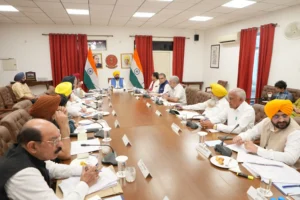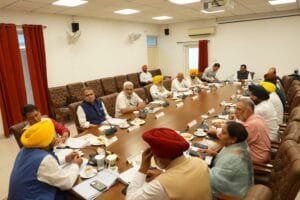Chandigarh, July 14 — The Punjab government on Monday introduced a Bill in the state assembly proposing life imprisonment for sacrilegious acts against religious scriptures, aiming to address what it described as a serious legal and societal gap.
Chief Minister Bhagwant Mann tabled the Punjab Prevention of Offences Against Holy Scriptures Bill, 2025 on the third day of the special session of the Vidhan Sabha. The Bill mandates severe penalties, including life imprisonment, for desecration of sacred texts such as the Sri Guru Granth Sahib, the Bhagavad Gita, the Bible, and the Quran.
“This law will ensure peace, brotherhood, and communal harmony,” said an official spokesperson after the Cabinet cleared the Bill earlier in the day at a meeting chaired by Mann. “It is meant to act as a deterrent against anti-social and anti-national elements.”

According to the proposed law, those convicted of sacrilege could face imprisonment ranging from 10 years to life. Attempting the offence may attract a sentence of three to five years, while abetment would be punishable in accordance with the offence committed. The draft legislation also includes provisions for special courts and denies parole to offenders.
The Bill comes in response to what officials called a lack of stringent laws under the Bharatiya Nyaya Sanhita. While Sections 298 to 300 address religious offences, “they fall short of providing strong deterrence,” the spokesperson noted.
Leader of the Opposition and Congress MLA Partap Singh Bajwa termed the issue “grave” and urged Speaker Kultar Singh Sandhwan to defer the discussion to Tuesday, the final day of the session. “It deserves more time and broader debate,” Bajwa said.
Chief Minister Mann earlier said the government would consult religious bodies and stakeholders before finalising the law. “We are drafting it,” he said recently. “But before enacting anything, we’ll talk to religious organisations. The Bill will be shared and discussed.”

This is not the first legislative attempt in Punjab to address sacrilege. The SAD-BJP government had introduced the IPC (Punjab Amendment) Bill, 2016, seeking life imprisonment for desecration of the Guru Granth Sahib, but it was returned by the Centre citing the need for equal treatment of all religions. Similarly, the Amarinder Singh-led Congress government in 2018 passed two amendment Bills to cover all major religious scriptures; however, they failed to secure presidential assent.
Punjab has witnessed several high-profile sacrilege incidents, most notably the 2015 case in Faridkot where torn pages of the Guru Granth Sahib were found in Bargari, triggering mass protests. Police firing during demonstrations in Behbal Kalan led to the death of two protesters and injuries in Kotkapura, deepening public outrage.
The new Bill is intended to fill what the government calls a legal vacuum, which previously allowed offenders to escape serious consequences. “Until now, there was no law that directly addressed offences against ‘holy granths’, which resulted in legal leniency,” the spokesperson said.
In a parallel move during the Cabinet meeting, the government also approved the Punjab Regulation of Crusher Units, and Stockists and Retailer Rules, 2025 to enforce legal and environmental compliance among crusher units and preventing illegal mining of sand and gravel.
The rules establish clear procedures and compliance protocols under the Punjab Regulation of Crusher Units, and Stockists and Retailer Act, 2025, with the goal of improving transparency, preventing royalty evasion, and curbing environmentally damaging practices.


